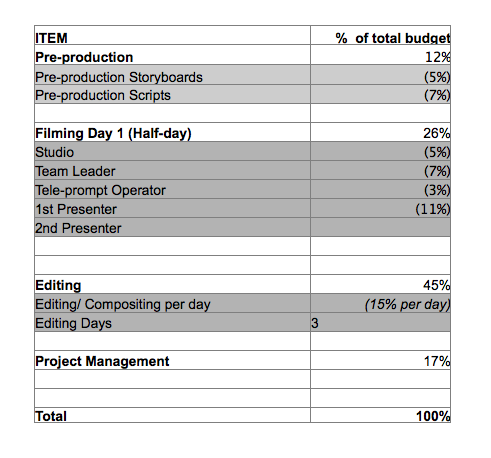Producing corporate videos can be a really fulfilling process. Whether you are working independently or with a production company, you need a budget. A budget outlines what money you need to spend in order to complete your project. It is a line by line statement of the products and services that you will purchase throughout the production process. This post will take you through the process of building a budget for your corporate video production.
Once you understand your budget then you can get on with planning how to make an engaging corporate video
A budget is a really important tool and should help everyone understand the costs involved in the production and the limits to what they can spend. If you are planning to go to a production company, it is good to be prepared with a production brief and an idea of what budget you are able to allocate to the project. They can then tailor their services within the financial parameters you have set.
The main challenge when putting a budget together is in estimating the amount of work that a particular project will actually take. This is a skill that definitely gets easier with experience but if you plan carefully and communicate well with the people involved, you should be able to avoid over-spending.
What is a corporate video production budget template?
A budget template is a pre-formatted Excel (or Numbers) spreadsheet that can be used when budgeting for different video productions. You can create a template yourself that you can use on different projects, or there are many free templates online that you can borrow. Most will include the same types of things and you can always customise an existing template to suit your purposes.
A budget template allows you to price individual units and add quantities. The spreadsheet will be formulated so that it automatically does the maths for you. This means that you can experiment with quantities for particular items and assess the overall impact on your budget.
What should be included in a video production budget?
Pre-production costs
Planning: story-boarding, script writing, management and preparation (e.g. time spent auditioning and hiring actors). Script writing is possibly the most important element of planning for the production stage. If you have scripted accurately what you would like to see and hear in your video, you will save time and money.
In this case, associated costs will be in terms of people’s time for doing the work mentioned.
Video production costs
Crew: you will need to pay for your camera and sound operators
Equipment hire: unless you already own your own equipment, you will need to budget for hire fees of any equipment or extra equipment needed.
Studio hire or location fees: you may need to pay for studio space or location fees. Be aware that the more locations you use, the more your production will cost you; not only in terms of location fees but also because of the knock on effect on travel expenses and crew time for travel.
Travel costs: if you use multiple locations you will need to cover travel costs of crew and actors involved.
Hospitality: it is important that your crew and any actors/presenters etc are fed and watered during production. A happy team is a productive team!
Talent: If you use a presenter or actors you will need to cover their fees.
Post-production costs
Editing suite: if you plan well enough you should be able to estimate how much footage you will have and how long you need an editing suite for.
Editor: editors have standard fees and so this should be easy to plan for if you have accurately estimated the amount of time you will need an editor for.
Graphics and animation: graphics and animation are great for getting information across that can’t otherwise be said or seen. If you have a presenter or a voice over, graphics and titles might be unnecessary. Or, you might want to use titles and graphics instead of a presenter.
Professional voice over: you may have decided to record some narration/professional voice over for your video. The fee will depend on the profile of the individual you choose i.e. you will be looking at paying a lot more for a celebrity.
Creation of subtitles: it may be necessary to create subtitles for SEO purposes, or you may want you script available in alternative languages.
DVD’s/tapes: you need to budget for any deliverables like DVD’s or tapes.
Other cost considerations
Unforeseen contingencies: it is sensible to put something in your budget to cover any unexpected costs that might arise throughout the process.
Markup to cover production company overheads: in some circumstances when working with a production company, you will be expected to pay a standard percentage of your budget to go towards production company overheads (generally 5% of the total budget). Clarify this with the production company at the outset.
Having a budget means that you can feel secure about what you are spending on your project because you know what you have and are keeping track of your outgoings. Feeling in control should make the whole process of video production easier and less stressful.
Here is an example of a simple budget which gives a breakdown of costs. This explains where the division of expenses is likely to lie (in percentage terms) when you use a video production company:
